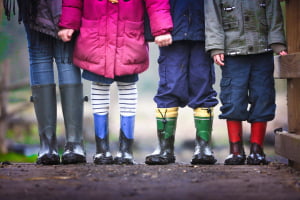Parenting is no easy feat. There are many blessings and challenges along the road of child-rearing. There are monumental moments in our child’s emotional journey where we want to become Mama Bear or Papa Bear and intervene to protect our cubs.
 As a parent, we must raise kindhearted compassionate individuals who can make the world a better place. It is also critical that we educate them on the realities of the cruelty that happens in the world and how to deal with those situations. We do not want our children to be caught off guard and stunned by the harsh and hurtful personalities that fill our world.
As a parent, we must raise kindhearted compassionate individuals who can make the world a better place. It is also critical that we educate them on the realities of the cruelty that happens in the world and how to deal with those situations. We do not want our children to be caught off guard and stunned by the harsh and hurtful personalities that fill our world.
Many things are difficult to see happen to our children:
- Getting picked last for a team sport in P.E. class
- Heartbreak over their first crush
- Losing a friend to someone more popular
- Having someone spread lies or gossip about them
- Being laughed at or mocked for something they are wearing
- Being made fun of or called names for trying to do the right thing
Unfortunately, our children will face harsh realities in every stage of life. While we cannot always protect them from the bullies or unfortunate situations they will encounter, we can teach them how to respond, when to remove themselves from toxic relationships, and how they can spread kindness when darkness is hovering around them.
Bullying prevention begins at home – raising awareness, teaching kindness, offering grace, demonstrating compassion, and opening that pathway of communication so they have a safe place to share what is on their heart and mind. Laguna Christian Counseling can support families in creating a nurturing environment where these values are encouraged and children feel safe to express themselves.
“Do things for people not because of who they are or what they do in return, but because of who you are.” – Harold S. Kushner
6 Ways to Implement Bullying Prevention at Home
1. Start using cell phones and social media at an appropriate age.
 One of the leading factors in bullying others is the fact that it can be done behind closed doors and not be held accountable for it. Cyberbullies often dare to say things with the click of their fingers that they would not say aloud to someone. It is important to educate children on the dangers of social media (and the benefits as well) and keep them from using it too soon.
One of the leading factors in bullying others is the fact that it can be done behind closed doors and not be held accountable for it. Cyberbullies often dare to say things with the click of their fingers that they would not say aloud to someone. It is important to educate children on the dangers of social media (and the benefits as well) and keep them from using it too soon.
We must raise children to use electronics and social media for good. This means teaching them not to get involved in inappropriate online conversations, and that people who are typing things behind a screen might feel in control because they are not in control of other areas of their life. Someone once said that “Cyber bullies can hide behind a mask of anonymity online and do not need direct physical access to their victims to do unimaginable harm.”
2. Talk to your children about why bullying happens.
Bullies are often insecure individuals who are looking for an outlet to spew their pain on someone else. They are often the victims of abuse themselves and perhaps they have not been taught another way. Perhaps they are never shown love and compassion under the roof of their home. Perhaps they have spent their lives hiding from people.
Perhaps their scars are both physical and emotional and they want to inflict that same pain on someone else because it is all they know. While we may not always be able to rationalize overnight with someone who has years and years of physical bruises and emotional beat-downs, we can teach our children that bullying is often the result of someone else being mistreated.
It is our goal, as parents, to end that cycle by raising children who are not bullies, but individuals who know how to stand up for what they believe in, love other people, and yearn to do small things that can make a huge difference.
3. Talk to your children about what they can do if someone is being mistreated.
It is important to teach your children to communicate with you, their teachers, their peers, or whoever is in charge when they see bullying occur. They can hold their own friends accountable and intervene when they are gossiping or making fun of people. Sometimes children do not realize how harmful gossip can be.
 “Silly Faces”, Courtesy of Austin Pacheco, Unsplash.com, CC0 License; A child must have a safety net at home where they feel free to bare their souls to their parents and ask for wisdom in situations where they can make a difference or when there are situations that may be out of their control.
“Silly Faces”, Courtesy of Austin Pacheco, Unsplash.com, CC0 License; A child must have a safety net at home where they feel free to bare their souls to their parents and ask for wisdom in situations where they can make a difference or when there are situations that may be out of their control.
If a child is being bullied at school, they can always talk to a teacher or school counselor. If they see someone sitting alone who is being made fun of for being a loner, they can always go have lunch with this person and try to make conversation and let them know that they are seen.
Some children pull away to themselves if they have been victims of abuse or have had a life of constant instability. Children thrive in secure environments, and if they do not feel safe, may retreat and keep to themselves.
4. Ask your children questions about how people treat them.
Ask simple questions like
- “How are your friends? What do you guys like to do for fun?”
- “Have you made any new friends lately?”
- “Who do you like to sit with at lunch?”
- “Do you ever see anyone sitting alone in the lunchroom?”
- “How do the other kids act in your class?”
- “Do you like school? Why/why not?”
Simple questions can start the conversation about bullying and how others are being treated or how your child is being treated. You must ensure that they are not silently suffering from the harsh treatment of bullies.
5. Teach children to embrace diversity.
Maya Angelou wisely stated, “We delight in the beauty of a butterfly, but rarely admit the changes it has gone through to achieve that beauty.”
It is essential to raise children that embrace diversity. It is good to have friends who are different – they may think differently and offer a new perspective. Our children can embrace their own unique style and do not have to copy other people.
We must instill in our children a strong will that is not easily swayed and stands up for what we believe in. We can be friends with someone who is of different ethnicity and does not like all the same things that we do.
 We live in a harsh world where children struggle because their parents are divorced and cannot stand one another. We are surrounded by children who are physically and verbally abused every day and crave a safe place to call home. We are surrounded by children who are made fun of and told they will never amount to anything.
We live in a harsh world where children struggle because their parents are divorced and cannot stand one another. We are surrounded by children who are physically and verbally abused every day and crave a safe place to call home. We are surrounded by children who are made fun of and told they will never amount to anything.
That is why parents are tasked with the mission of raising children who are world-changers who speak truth to and about other people, offering a little glimmer of hope in a very dark time. Our children can be the small spark that ignites the compassionate flame of a bully who has never believed in themselves or that someone else cared about them.
6. Instill Biblical principles in your children.
Children must believe in their value and worth. It is important to raise them knowing that there is much hope beyond what this world has to offer. We want them to know that our time on this earth is about so much more than being popular or making a lot of money. 1 Timothy 4:12 reminds us, “Don’t let anyone look down on you because you are young, but set an example for the believers in speech, in conduct, in love, in faith and in purity.”
Parents are charged to lead by example. Parents are charged to raise children who choose light over darkness. Parents are charged to show the love and compassion of Jesus while disciplining and teaching children right from wrong.
“Love and kindness are never wasted. They always make a difference. They bless the one who receives them, and they bless you, the giver.” – Barbara De Angelis
Consider Christian Counseling
If your child has been the victim of bullying or is struggling with how to respond to bullies and how to make a difference, counseling may be a perfect choice. Family counseling or individual counseling are both great options for bullying prevention depending on the needs of your child and your family. Laguna Christian Counseling can help guide you through this challenging time. It is important to start the conversation today about the effects and causes of bullying to ensure that your child is not put in situations where they may be cyberbullied.
“Ready for the Rain”, Courtesy of Ben Wicks, Unsplash.com, CC0 License; “Bubbles”, Courtesy of Alexander Dummer, Unsplash.com, CC0 License; “Silly Faces”, Courtesy of Austin Pacheco, Unsplash.com, CC0 License; “Bobbing for Apples”, Courtesy of Ashton Bingham, Unsplash.com, CC0 License
- Kate Motaung: Curator
Kate Motaung is the Senior Writer, Editor, and Content Manager for a multi-state company. She is the author of several books including Letters to Grief, 101 Prayers for Comfort in Difficult Times, and A Place to Land: A Story of Longing and Belonging...
Recent Posts
DISCLAIMER: THIS ARTICLE DOES NOT PROVIDE MEDICAL ADVICE
Articles are intended for informational purposes only and do not constitute medical advice; the content is not intended to be a substitute for professional medical advice, diagnosis, or treatment. All opinions expressed by authors and quoted sources are their own and do not necessarily reflect the opinions of the editors, publishers or editorial boards of Stone Oak Christian Counseling. This website does not recommend or endorse any specific tests, physicians, products, procedures, opinions, or other information that may be mentioned on the Site. Reliance on any information provided by this website is solely at your own risk.





